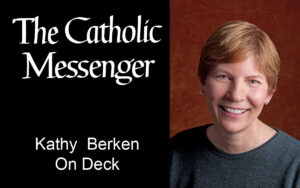By Kathy Berken
In early May, I witnessed a man’s death.
 Five of us were returning from a staff outing, laughing and talking in the car. I was in the back seat when we stopped at a busy intersection near Macalester College here in Saint Paul, Minn. I looked left and saw the yellow bus screech to a halt. A person with a red jacket, limbs flailing, tumbled through the air and landed on the pavement. He never moved. Two young women walked up and screamed. Another woman knelt down, pulled her hair behind her head and appeared to be looking for signs of life. In front of us, a man walked slowly towards the scene, talking into his phone. We pulled over, stopped, and stared. “What did you see?” “Is he alive?” “How are those kids on the bus doing?” “How do you think that driver feels?”
Five of us were returning from a staff outing, laughing and talking in the car. I was in the back seat when we stopped at a busy intersection near Macalester College here in Saint Paul, Minn. I looked left and saw the yellow bus screech to a halt. A person with a red jacket, limbs flailing, tumbled through the air and landed on the pavement. He never moved. Two young women walked up and screamed. Another woman knelt down, pulled her hair behind her head and appeared to be looking for signs of life. In front of us, a man walked slowly towards the scene, talking into his phone. We pulled over, stopped, and stared. “What did you see?” “Is he alive?” “How are those kids on the bus doing?” “How do you think that driver feels?”
Two hours later, I learned the cyclist had been declared dead at the scene. His name was Alan Grahn, a 75-year-old man who was returning from lunch with friends. Despite his age, he was an avid outdoorsman, a rock climber, an experienced cyclist. On his Facebook page, he called himself “happily retired.” I found a smiling photo of him in a red jacket and helmet, straddling his bike, with his grandsons in an attached trailer. His obituary called him a “skilled philosopher, climber, skier, runner and biker [who] climbed and hiked around the world and made friends wherever he went. He was smart, funny, loving, irreverent and a consummate outdoorsman.”
I doubt that the bus driver or Alan saw each other; or the driver saw him too late and could not stop his 15-ton vehicle from hitting him head on.
After I got home, and once I stopped crying, I wondered whether Alan’s death could possibly have any meaning.
Was it too soon to try to find anything redeeming in this senseless, horrific accident? Perhaps for Alan’s family and friends it was, but for those of us who are more distant, there might be something worth noting now.
First, it’s important to deal with the psychological/emotional trauma from this kind of experience. In a Neil Sattin podcast (“How to heal your triggers and trauma,” March 29, 2016), Dr. Peter Levine, a noted practitioner, lecturer and author of trauma resolution therapy books, said that unresolved trauma “can leave parts of us physically, emotionally and psychologically stuck. Our past lives in us in ways that we are often unaware of.”
Second, as an experienced cyclist myself, I learn from events like this. A few years ago, a friend hit a pothole, flew off his bike and broke several bones. I now pay much closer attention to potholes. Alan’s accident teaches me to ride defensively, never to trust that any driver can see me and, as a driver, to double-check intersections and crosswalks.
Finally, the evening before Alan’s death, I jotted some notes on what I thought was going to be this month’s column: “What does ‘Jesus died for us’ mean?” Once a deep mystery, I think I now have a different take on its meaning. Alan died for me. He died for every cyclist, every school bus driver, every person who witnessed or heard the story of his tragic death and, as a result, may be an even more defensive cyclist, an even more vigilant driver, an even more compassionate passerby. Jesus teaches me deep lessons from his suffering and death, too. Perhaps a topic for a future column!
Like Jesus, Alan did not die in vain. A white-painted bike rests on that corner, decorated with flowers and memorabilia. His Facebook page is now a memorial page. And if his family and friends are anything like him, they will find hope. Hope of the kind Simba sang in “The Lion King” after his father died: “I know that the night must end, I know that the clouds must clear, I know that the sun will rise. And I’ll hear your voice deep inside.”
(Kathy Berken has a master’s degree in theology from St. Catherine University, St. Paul, Minn. She lived and worked at The Arche, L’Arche in Clinton 1999-2009 and is author of “Walking on a Rolling Deck: Life on the Ark (stories from The Arch).”)











